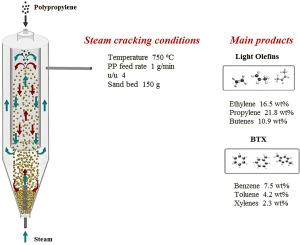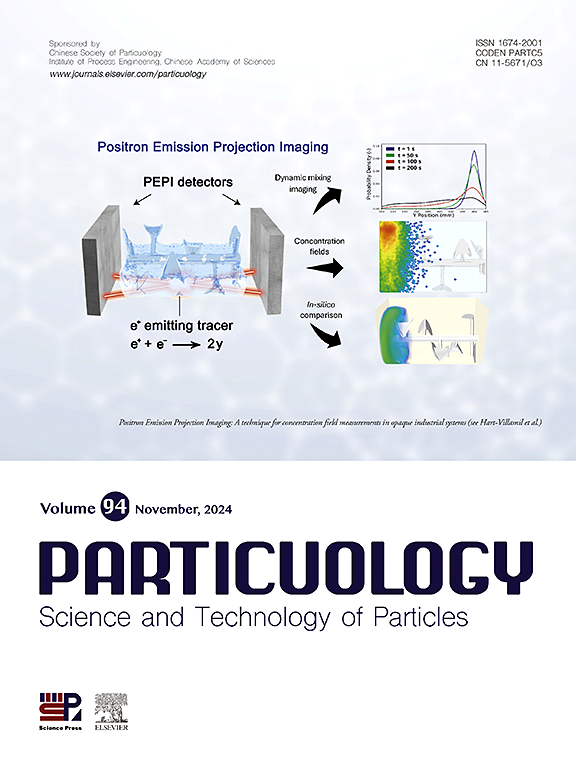喷泉密闭锥形喷射床反应器中聚丙烯蒸汽裂解生产轻烯烃的研究
IF 4.3
2区 材料科学
Q2 ENGINEERING, CHEMICAL
引用次数: 0
摘要
本文提出了一种在喷泉密闭锥形喷床反应器中处理塑料废弃物的替代方法。本研究以高附加值产品为重点,对改进后的喷淋床设计在750°C蒸汽裂解聚丙烯(PP)中的应用进行了评估。该高效裂解工艺的产气率高达80.9 wt%。该流程由H2、CO、CO2、C1-C4石蜡和C2-C4烯烃组成,其中C2-C4烯烃的总收率为49.2% wt%。在轻烯烃中,丙烯(21.8% wt%)和乙烯(16.5% wt%)是最相关的。有趣的是,获得了有价值的BTX分数的显着收率,14.0 wt%,苯是主要化合物。反应器结构和良好的工艺条件控制提高了β-裂解和自由基机制下的轻烯烃收率,促进了轻烃的形成,减少了二次低聚和重整反应。本研究证明了蒸汽裂解在喷泉密闭喷床反应器中将PP转化为有价值的化学中间体的可行性,以及该技术在废塑料增值工业应用中的可行性。本文章由计算机程序翻译,如有差异,请以英文原文为准。

Steam cracking of polypropylene for the production of light olefins in a fountain confined conical spouted bed reactor
This paper presents an alternative approach for plastic waste valorization in a fountain confined conical spouted bed reactor. The study evaluates the application of an upgraded spouted bed design for the steam cracking of polypropylene (PP) at 750 °C, focusing on high value added products. The highly efficient cracking process results in a high gas yield of 80.9 wt%. This stream is composed of H2, CO, CO2, C1-C4 paraffins and C2-C4 olefins, with the latter reaching a total yield of 49.2 wt%. Among the light olefins, propylene (21.8 wt%) and ethylene (16.5 wt%) are the most relevant. Interestingly, a remarkable yield of the valuable BTX fraction was obtained, 14.0 wt%, with benzene being the predominant compound. The reactor configuration and excellent control of process conditions enhanced light olefins yield by β-scission and radical mechanism, promoting the formation of light hydrocarbons, as well as minimizing secondary oligomerization and reforming reactions. This study is a proof of the viability of steam cracking in a fountain confined spouted bed reactor for converting PP into valuable chemical intermediates, as well as the viability of this technology for industrial application in waste plastic valorization.
求助全文
通过发布文献求助,成功后即可免费获取论文全文。
去求助
来源期刊

Particuology
工程技术-材料科学:综合
CiteScore
6.70
自引率
2.90%
发文量
1730
审稿时长
32 days
期刊介绍:
The word ‘particuology’ was coined to parallel the discipline for the science and technology of particles.
Particuology is an interdisciplinary journal that publishes frontier research articles and critical reviews on the discovery, formulation and engineering of particulate materials, processes and systems. It especially welcomes contributions utilising advanced theoretical, modelling and measurement methods to enable the discovery and creation of new particulate materials, and the manufacturing of functional particulate-based products, such as sensors.
Papers are handled by Thematic Editors who oversee contributions from specific subject fields. These fields are classified into: Particle Synthesis and Modification; Particle Characterization and Measurement; Granular Systems and Bulk Solids Technology; Fluidization and Particle-Fluid Systems; Aerosols; and Applications of Particle Technology.
Key topics concerning the creation and processing of particulates include:
-Modelling and simulation of particle formation, collective behaviour of particles and systems for particle production over a broad spectrum of length scales
-Mining of experimental data for particle synthesis and surface properties to facilitate the creation of new materials and processes
-Particle design and preparation including controlled response and sensing functionalities in formation, delivery systems and biological systems, etc.
-Experimental and computational methods for visualization and analysis of particulate system.
These topics are broadly relevant to the production of materials, pharmaceuticals and food, and to the conversion of energy resources to fuels and protection of the environment.
 求助内容:
求助内容: 应助结果提醒方式:
应助结果提醒方式:


